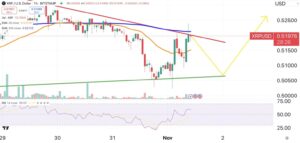Last updated:
 Why Trust Cryptonews
Why Trust Cryptonews

Paxos has launched its new Global Dollar (USDG), a US dollar-backed stablecoin designed to comply with the Monetary Authority of Singapore (MAS) regulatory framework.
USDG’s reserves will be held by DBS Bank, Southeast Asia’s largest bank, known for its stringent compliance with financial regulatory standards.
The stablecoin is initially available on the Ethereum blockchain and will soon be integrated into other blockchains. USDG aims to drive increased enterprise adoption of stablecoins by combining regulatory compliance with robust liquidity standards.
Paxos Singapore USDG Stablecoin: Is This the Key to Mass Adoption?
USDG adheres to MAS’s stablecoin regulations. It is backed 1:1 with the US dollar in high-quality, liquid assets, such as US dollar deposits and short-duration government securities, which DBS Bank manages.
Paxos’ Head of Product, Ronak Daya, emphasized the enterprise’s interest in stablecoins, noting;
“Enterprise interest in stablecoins has never been higher than it is today, but the market lacks a solution that combines regulatory compliance with real economic incentives for enterprises.”
DBS Bank will also serve as Paxos’ primary banking partner.
USDG’s launch in Singapore follows MAS’s recent stablecoin framework announcement, marking it as one of the earliest stablecoin offerings to meet these regulatory guidelines.
According to a recent report, in Singapore, stablecoin payments reached an unprecedented $1 billion in Q2, driven primarily by merchant transactions that benefited from stablecoins’ efficiency and low cost.
This marks a substantial rise from the $161 million recorded in 2023.
Due to their pegged value, these stablecoins facilitate faster transactions, reduced fees, and seamless operations, enhancing business efficiency across the region.
Singapore’s MAS has established a rigorous licensing process for stablecoin issuers, focusing on financial stability, compliance, and anti-money laundering (AML) protocols to secure the industry against bad actors.
As a regulated entity, Paxos Digital Singapore obtained full approval from MAS late last year to provide crypto services.
The collaboration with DBS Bank is expected to create an environment of trust and stability, making USDG suitable for both crypto-native businesses and traditional financial institutions seeking reliable entry points into digital assets.
Since 2020, Paxos has issued multiple regulated assets, including PayPal USD (PYUSD), Pax Dollar (USDP), and Pax Gold (PAXG) in the U.S. and the Lift Dollar (USDL) in the UAE.
Paxos’ Expansion of Stablecoin Infrastructure and the Road Ahead
As part of its vision to extend USDG’s reach, Paxos plans to collaborate with major global exchanges, wallets, and other financial platforms.
It will support both Ethereum and additional blockchain networks to help maximize USDG’s accessibility.
This strategic entry aligns with the increasing demand from financial institutions for compliant, secure, and easily redeemable digital assets.
Notably, in an open letter to Vice President Kamala Harris and former President Donald Trump, Paxos CEO Charles Cascarilla recently urged the U.S. to take swift action on digital asset regulation to maintain its financial leadership.
Cascarilla emphasized that stablecoins and blockchain are essential tools for modernizing the U.S. financial system, which currently relies on outdated infrastructure.
He warned that the U.S. risks falling behind as regions like Singapore, the UAE, and the EU adopt favorable blockchain regulations, attracting capital and talent.
Similarly, on October 15, 2024, Paxos launched a new stablecoin payments platform tailored for payment service providers (PSPs) and fintech firms, with Stripe as one of its first major partners.
This platform is designed to simplify global transactions by offering a stablecoin payment system that enables fast, low-cost international transfers.
Through Stripe’s integration, users can process stablecoin payments that settle in fiat, with comprehensive support for onboarding, pay-ins, conversions, and payouts.















